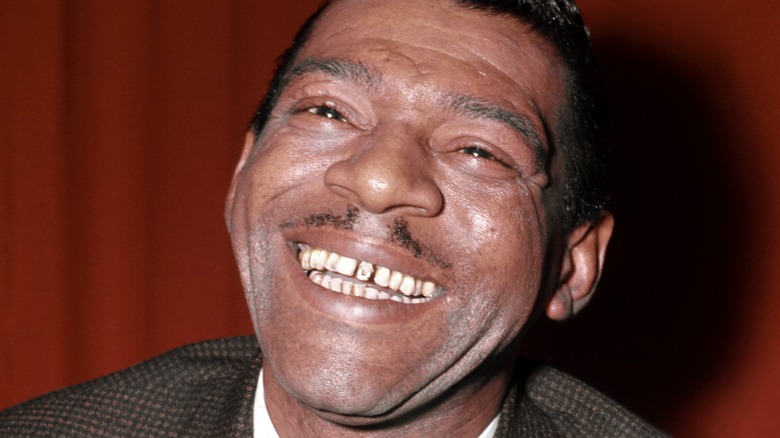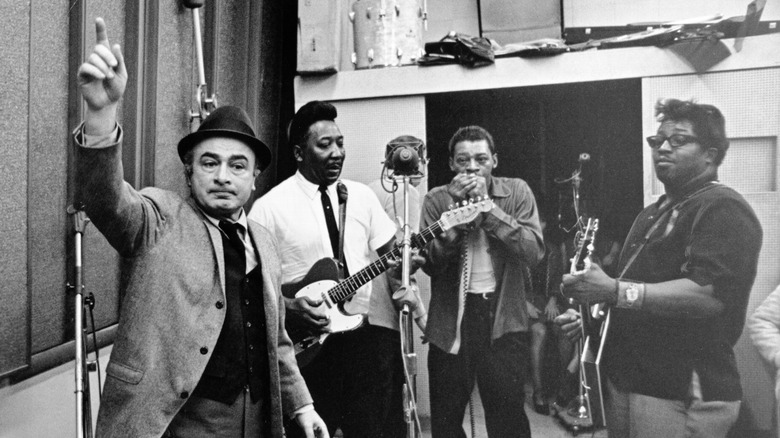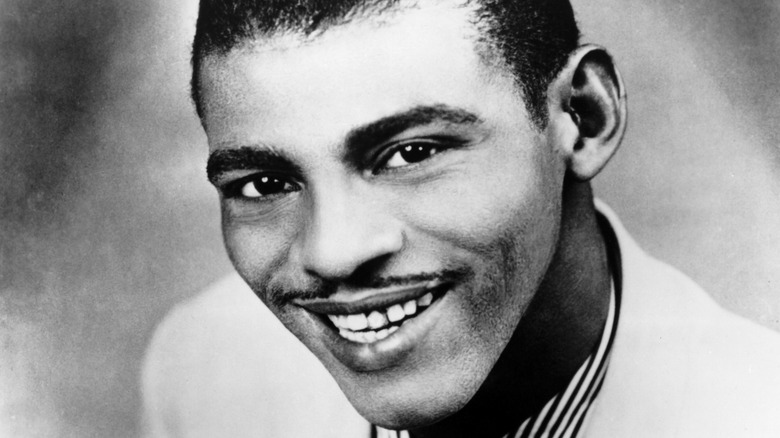The Unexpected Official Cause Of Death Of Blues Legend Little Walter
At the time of his death, 37-year-old blues performer Little Walter, was famous for his innovation in the music industry (via OffBeat). Born in Rapides, Louisiana as Marion Walter Jacobs in 1930, Little Walter left school at the age of 12 and started traveling around the United States playing his harmonica (via American Blues Scene). Exhausted by the sounds of heavy guitars drowning out his unique harmonica sounds, Jacobs started mic'ing up his instrument so that it would stand out. While this may seem like a no-brainer today where every instrument is boosted before a show, Jacobs revolutionized amplification and electronic distortion.
In 1952, Jacobs released "Juke" via Chess Records, and the song remains as the only harmonica instrumental to reach #1 on the Billboard R&B charts. To date, Jacobs is the only person to ever be inducted into the Rock & Roll Hall of Fame as a harmonica player.
If you see Jacobs credited frequently as a harp player, don't get the idea he was sitting on an orchestral stage plucking strings. Harp, according to American Blues Scene, is blues slang. The harmonica is also sometimes called a "comb" but harp is the more common nomenclature. Harps spread to the South in 1857 when German immigrants settled across the land, many performing in vaudeville with the instrument (via Smithsonian Magazine).
Jacobs became revolutionary for the way in which he toyed with the "harp," bending the notes in such a way to imprint R&B saxophone sounds on his instrument. On top of this, he amplified the instrument to the absolute extreme, toying with delay and reverb and other amplifier effects. Many music historians cite him as the first individual to ever utilize distortion. But Jacobs was known around the Chicago and New Orleans music scenes for much more than his innovation in harp playing and sound dynamics.
A checkered life
According to Britannica, Marion Jacobs settled in Chicago around 1946 and played in Muddy Waters' blues band between 1948 and 1952. NPR reports that once Little Walter had a taste of success, which incidentally happened while he was on tour with Waters, he quit the band entirely. With success, it appears Jacobs' head got a bit big and he had epic fallouts with everyone in his path, including his guitarist Louis Meyers, who suspected that the harp player was skimming off the top of their earnings.
By 1954, Jacobs didn't mind embracing his reputation: he penned the song "Sloppy Drunk" with lyrics that unabashedly declared (via Lyrics.com), "I would rather be sloppy drunk, than anything I know...Give me another half a pint boy, then you will see me go...Now I love that moonshine whiskey now, tell the world I do...Now this is the reason why that I drink, I'm just trying to get along with you."
News of Jacobs's attitude and drinking problems in the small world of the music business reached far and wide. In 1958, his drinking led a woman to shoot him in the leg, causing him to limp for the rest of his life. Furthermore, Jacobs's aggravation went beyond the ins and out of the day in the life of a musician. Jacobs was not happy in the 1950s as rock n' roll started to take off, resulting in the decline in blues music sales (via CelticGuitarMusic.com).
His former bandmate, Muddy Waters, had stated (via CelticGuitarMusic.com), "Little Walter was dead 10 years before he died." And yet the opportunity for success still loomed on the horizon for Jacobs. The Rolling Stones invited him to tour with them in England. It appears he did well across the Pond but comrades in the Chicago scene refused to play with the hot-tempered musician, pointing out that his voice was "embarrassing" and "worn out" (via NPR). Those in the music scene also knew that Jacobs was struggling with addictions beyond alcohol. Although the world-famous Rolling Stones were loyal fans and on his side, it still seemed that Jacobs couldn't catch a break.
A lot of heart
Little Walter was taking a break from performing at a venue in Chicago when a fight broke out on the night of February 15, 1968 (via OffBeat). He was hit in the head during the fight and went to bed with a headache, only to never awaken again. He was only 37 years old. According to American Blues Scene, the death certificate stated the bluesman had died of coronary thrombosis. This condition is defined by the National Library of Medicine as a heart attack, or basically the rupture of an artery to the heart — nothing necessarily connected to external injury. Police at the scene, who may not have been aware of the bar fight, stated he had died of unknown or natural causes. Some believe Jacobs' injuries sustained in the bar fight only exacerbated the plaque building up in his circulatory system. Curiously, the previous year, Jacobs had toured Europe with the American Folk Blues Festival, and some believed that he had quit drinking altogether (via NPR).
Little Walter's young life remains impactful to many, including the Rolling Stones with whom he toured. In 2016, the band released a blues record titled "Blues & Lonesome," inspired by one of Jacobs's tracks (via Vanity Fair). Jacobs' song eerily lamented that he was as blue and lonesome as a man could be and that "don't have headaches over myself/My love has gone away from me" (via SongLyrics.com).
In 2016, Keith Richards explained to Vanity Fair the impact that Little Walter had on the Rolling Stones and how he inspired the name of their album dedicated to blues covers, stating, "Little Walter inspired all of us with his work with Muddy Waters. He was Muddy's harp player for most of the 1950s, and it was always standout stuff."


